Google has added a few interface niceties to its Book Search book viewer. It now loads multiple pages at a time, giving readers the option of either scrolling down or paging through left to right. There’s also a full screen reading mode and a “more about this book” link taking you to a profile page with links to related titles plus references and citations from other books or from articles in Google Scholar. Also on the profile page is a searchable keyword cluster of high-incidence names or terms from the text.
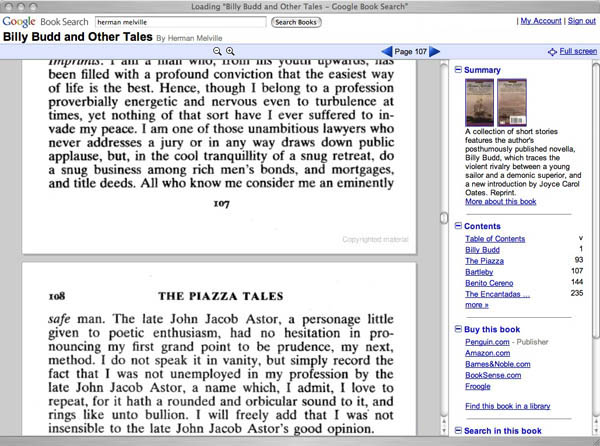
Above is the in-copyright Signet Classic edition of Billy Budd and Other Tales by Melville, which contains only a limited preview of the text. You can also view the entire original 1856 edition of Piazza Tales as scanned from the Stanford Library. Public domain editions like this one can now be viewed with facing pages.
Still a conspicuous lack of any annotation or social reading tools.
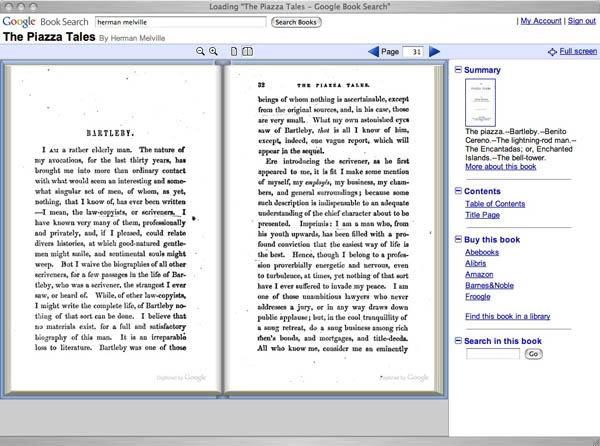
Category Archives: libraries
dutch fund audiovisual heritage to the tune of 173 million euros
Larry Lessig writes in Free Culture:
Why is it that the part of our culture that is recorded in newspapers remains perpetually accessible, while the part that is recorded on videotape is not? How is it that we’ve created a world where researchers trying to understand the effect of media on nineteenth-century America will have an easier time than researchers trying to understand the effect of media on twentieth-century America?
Twentieth century Holland, it turns out, will be easier to decipher:
The Netherlands Government announced in its annual budget proposal the support for the project “Images for the Future” (in Dutch). Images for the Future is a large-scale conservation and digitalisation operation comprising 285,000 hours of film, television and radio recordings, and 2.9 million photos. The investment of 173 million euro, is spread over a period of seven years.
…It is unprecedented in its scale and ambition. All these films, programmes and photos will be made available for educational and creative purposes. An infrastructure for digital distribution will also be developed. A basic collection will be made available without copyright or under a Creative Commons licence. Making this heritage digitally available will lead to innovative applications in the area of new media and the development of valuable services for the public. The income/expense analysis included in the project plan shows that on balance the project will produce a positive social effect in the Dutch economy to the value of 20 to 60 million euros.
— from Association of Moving Image Archivists list-server
Pretty inspiring stuff.
Eddie Izzard once described the Netherlandish brand of enlightenment in a nutshell: “The Dutch speak four languages and smoke marijuana!” We now see that they also deem it wise policy to support a comprehensive cultural infrastructure for the 21st century, enabling their citizens to read, quote and reuse the media that shapes their world (while they whiz around on bicycles over tidy networks of canals). Not so here in the States where the government works for the monopolies, keeping big media on the dole through Sonny Bono-style protectionism. We should pass our benighted politicos a little of what the Dutch are smoking.
laurels
We recently learned that the Institute has been honored in the Charleston Advisor‘s sixth annual Readers Choice Awards. The Advisor is a small but influential review of web technologies run by a highly respected coterie of librarians and information professionals, who also hold an important annual conference in (you guessed it) Charleston, South Carolina. We’ve been chosen for our work on the networked book:
The Institute for the Future of the Book is providing a creative new paradigm for monographic production as books move from print to the screen. This includes integration of multimedia, interviews with authors and inviting readers to comment on draft manuscripts.
A special award also went to Peter Suber for his tireless service on the Open Access News blog and the SPARC Open Access Forum. We’re grateful for this recognition, and to have been mentioned in such good company.
row after row after row after row
I want to tell you about one scene in a wonderful documentary, DOC, that just opened the Margaret Mead Film Festival at the Museum of Natural History in New York. Doc Humes was the founder of the Paris Review. Made by his daughter, Immy, the film follows Immy as she tries to uncover the layers of her father’s complex life. At one point she finds out that he made a feature film and she tries to find the footage. She gets a tip that Jonas Mekas may have a copy at Anthology Film Archives in the east village in New York. She goes to visit Mekas and takes her camera. Mekas takes her into the vast underground storeroom and points at row after row after row after row of film cans. The point of the shot is that looking for the film on these shelves — even if it were known to be here, which it isn’t — is a hopeless task. Nothing seems to be marked; there is no order. Rather than a salvation for the rich film culture that came out of NY in the 50s, 60s, and 70s, it seems that the Anthology Film Archive may become a graveyard.
Seeing this made me wonder about the decisions we make as a society about what to keep and what not to keep. There may be important film in those cans or there may not be. How do we decide whether to gather the resources to find out?
reading buildings
On Monday, Adriene Jenik, who is Associate Professor of Computer & Media Arts at UC San Diego, stopped by for what turned into an interesting discussion on the future of libraries. Adriene is a telecommunications media artist who has experimented extensively in virtual performance with projects like Desktop Theater and SPECFLIC, an ongoing “speculative distributed cinema project.”
More recently, she wrote and produced SPECFLIC 2.0, which explores the intersection of digital media, books, and reading. With the help of a large network of collaborating artists, Jenik transformed the Martin Luther King Library in San Jose into a one night only vision of the future called the InfoSphere, where a computerized reference librarian called The Infospherian provides an interface to all the bits of information what anyone might need, and is in charge of issuing and enforcing reading licenses to the public.
Before the group got to discussing how libraries where changing, Adriene and I first discussed how neighborhoods and cities develop; the way growth is encouraged and discouraged in certain areas, and of those who benefit from seeing either scenario play out.
As in the discussion we had about neighborhoods, I am ambivalent towards the way libraries are changing. People use search engines to find information quickly and are less frequently doing research in libraries. In fact, even in libraries computer labs tend to be the most populous rooms. The act of looking through physical books lends itself well to serendipitous discoveries, and while I agree that many of these kinds of experiences may be lost, it’s hard to really know for sure what is gained and what is lost when you’re in the midst of change.
For better or worse, as a tool, the library, as we know it today, appears to have lived out it’s life. In the future, the idea of a library as a museum, as opposed to an active location like a park makes a lot more sense to me. Something will be lost with the transition, that is for sure, and as much of it as possible should be preserved, but it’s hard to see today’s library being able to compete with the technologies of the future in the same way.
What I find bizarre about all this is that when you walk into a Barnes & Noble all the seats are taken, so it seems that “reading buildings” of some sort have some demand. Maybe it’s the social setting or maybe it’s the Starbucks. Actually, that could be the future of the library: a big empty building that people bring their electronic books to so that they can read and drink their coffee in a social setting… quietly.
“No analog book allowed inside library. Please digitize your analog book at the door.”
microsoft steps up book digitization
Back in June, Microsoft struck deals with the University of California and the University of Toronto to scan titles from their nearly 50 million (combined) books into its Windows Live Book Search service. Today, the Guardian reports that they’ve forged a new alliance with Cornell and are going to step up their scanning efforts toward a launch of the search portal sometime toward the beginning of next year. Microsoft will focus on public domain works, but is also courting publishers to submit in-copyright books.
Making these books searchable online is a great thing, but I’m worried by the implications of big coprorations building proprietary databases of public domain works. At the very least, we’ll need some sort of federated book search engine that can leap the walls of these competing services, matching text queries to texts in Google, Microsoft and the Open Content Alliance (which to my understanding is mostly Microsoft anyway).
But more important, we should get to work with OCR scanners and start extracting the texts to build our own databases. Even when they make the files available, as Google is starting to do, they’re giving them to us not as fully functioning digital texts (searchable, remixable), but as strings of snapshots of the scanned pages. That’s because they’re trying to keep control of the cultural DNA scanned from these books — that’s the value added to their search service.
But the public domain ought to be a public trust, a cultural infrastructure that is free to all. In the absence of some competing not-for-profit effort, we should at least start thinking about how we as stakeholders can demand better access to these public domain works. Microsoft and Google are free to scan them, and it’s good that someone has finally kickstarted a serious digitization campaign. It’s our job to hold them accountable, and to make sure that the public domain doesn’t get redefined as the semi-public domain.
books in time
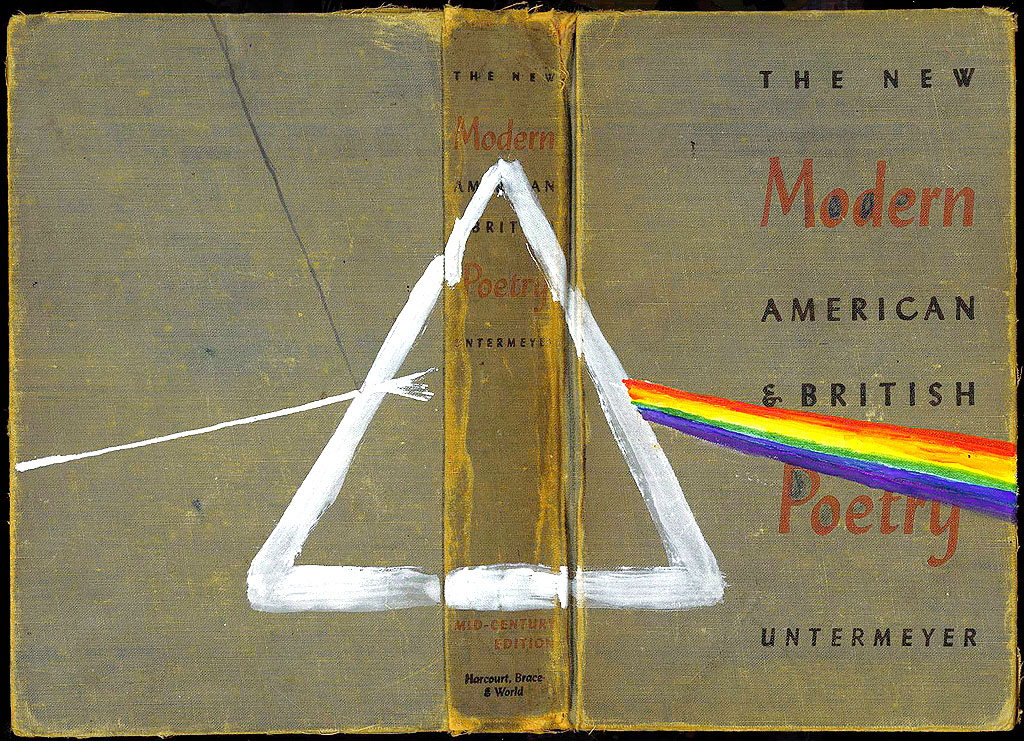
This morning I’m giving a talk on networked books at a libraries and technology conference up at Bentley College, just outside of Boston. The program, “Social Networking: Plugging New England Libraries into Web 2.0,” has been organized by NELINET, a consortium of over 600 academic, public and special libraries across the six New England states, so librarians and info services folks from all over the northeast will be in attendance.
In many ways, our publishing projects fit quite comfortably under the broad, buzz-ridden rubrique of Web 2.0: books as social spaces, “architecture of participation,” “treat your users as co-developers” (or, in our experiments, readers as co-authors). I’m going to be discussing all of these things, but I’m also planning to look at books in a slightly different way: as processes, or movements, in time.
Lately, when we’re explaining our work to the unitiated, Bob picks up whatever book is lying nearby (yes, we do have books), holds it up in the air and indicates with his hands the space on either side of the object: “here’s all the stuff that came before the book, and here’s all the stuff that came after.” That’s the spectrum that networked reading and writing opens up, and what the Institute are trying to do is to explore and open up new ways of thinking about all these different stages of creative flow that go into and out of books. Of our recent projects, you could say that Without Gods focuses on the “into” end of the evolutionary span while GAM3R 7H30RY deals more with the “out of.” Naturally, books have always been this way, but computers and networks make all of it manifest in a very new way that’s difficult to make sense of.
That’s what the picture up top is getting at, in a joshing way. Bob’s depiction of books in time reminded me of the famous prism image on the cover of Pink Floyd’s “Dark Side of the Moon” where pure white light turns to rainbow as it passes through the glass. I was joking about this with Alex Itin, our artblogger in residence, and yesterday he cobbled together this excellent image (and ripped the audio), which I’m going to work into my talk somehow. Wish me luck.
(Incidentally, “Books in Time” is the name of a wonderful essay by Carla Hesse, a Berkeley historian, which has been a big influence on what we do.)
google and the future of print
Veteran editor and publisher Jason Epstein, the man who first introduced paperbacks to American readers, discusses recent Google-related books (John Battelle, Jean-Noël Jeanneney, David Vise etc.) in the New York Review, and takes the opportunity to promote his own vision for the future of publishing. As if to reassure the Updikes of the world, Epstein insists that the “sparkling cloud of snippets” unleashed by Google’s mass digitization of libraries will, in combination with a radically decentralized print-on-demand infrastructure, guarantee a bright future for paper books:
[Google cofounder Larry] Page’s original conception for Google Book Search seems to have been that books, like the manuals he needed in high school, are data mines which users can search as they search the Web. But most books, unlike manuals, dictionaries, almanacs, cookbooks, scholarly journals, student trots, and so on, cannot be adequately represented by Googling such subjects as Achilles/wrath or Othello/jealousy or Ahab/whales. The Iliad, the plays of Shakespeare, Moby-Dick are themselves information to be read and pondered in their entirety. As digitization and its long tail adjust to the norms of human nature this misconception will cure itself as will the related error that books transmitted electronically will necessarily be read on electronic devices.
Epstein predicts that in the near future nearly all books will be located and accessed through a universal digital library (such as Google and its competitors are building), and, when desired, delivered directly to readers around the world — made to order, one at a time — through printing machines no bigger than a Xerox copier or ATM, which you’ll find at your local library or Kinkos, or maybe eventually in your home.
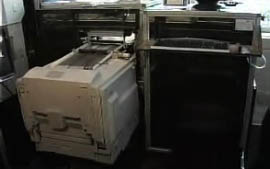 Predicated on the “long tail” paradigm of sustained low-amplitude sales over time (known in book publishing as the backlist), these machines would, according to Epstein, replace the publishing system that has been in place since Gutenberg, eliminating the intermediate steps of bulk printing, warehousing, retail distribution, and reversing the recent trend of consolidation that has depleted print culture and turned book business into a blockbuster market.
Predicated on the “long tail” paradigm of sustained low-amplitude sales over time (known in book publishing as the backlist), these machines would, according to Epstein, replace the publishing system that has been in place since Gutenberg, eliminating the intermediate steps of bulk printing, warehousing, retail distribution, and reversing the recent trend of consolidation that has depleted print culture and turned book business into a blockbuster market.
Epstein has founded a new company, OnDemand Books, to realize this vision, and earlier this year, they installed test versions of the new “Espresso Book Machine” (pictured) — capable of producing a trade paperback in ten minutes — at the World Bank in Washington and (with no small measure of symbolism) at the Library of Alexandria in Egypt.
Epstein is confident that, with a print publishing system as distributed and (nearly) instantaneous as the internet, the codex book will persist as the dominant reading mode far into the digital age.
google to scan spanish library books
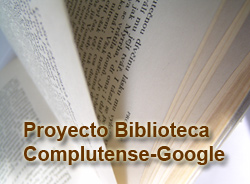 The Complutense University of Madrid is the latest library to join Google’s digitization project, offering public domain works from its collection of more than 3 million volumes. Most of the books to be scanned will be in Spanish, as well as other European languages (read more in Reuters , or at the Biblioteca Complutense (en espagnol)). I also recently came across news that Google is seeking commercial partnerships with english-language publishers in India.
The Complutense University of Madrid is the latest library to join Google’s digitization project, offering public domain works from its collection of more than 3 million volumes. Most of the books to be scanned will be in Spanish, as well as other European languages (read more in Reuters , or at the Biblioteca Complutense (en espagnol)). I also recently came across news that Google is seeking commercial partnerships with english-language publishers in India.
While celebrating the fact that these books will be online (and presumably downloadable in Google’s shoddy, unsearchable PDF editions), we should consider some of the dynamics underlying the migration of the world’s libraries and publishing houses to the supposedly placeless place we inhabit, the web.
No doubt, Google’s scanners are aquiring an increasingly global reach, but digitization is a double-edged process. Think about the scanner. A photographic technology, it captures images and freezes states. What Google is doing is essentially photographing the world’s libraries and preparing the ultimate slideshow of human knowledge, the sequence and combination of the slides to be determined each time by the queries of each reader.
But perhaps Google’s scanners, in their dutifully accurate way, are in effect cloning existing arrangements of knowledge, preserving cultural trade deficits, and reinforcing the flow of knowledge power — all things we should be questioning at a time when new technologies have the potential to jigger old equations.
With Complutense on board, we see a familiar pyramid taking shape. Spanish takes its place below English in the global language hierarchy. Others will soon follow, completing this facsimile of the existing order.
two copyright manifestos out of britain
The British Academy:
“…the copyright system may in important respects be impeding, rather than stimulating, the production of new ideas and new scholarship in the humanities and social sciences.”
The British Library:
“Existing legislation urgently needs to be updated, though the manner in which this is achieved has the potential to nurture or curtail the development of new kinds of creativity and new models of public and private sector value.”
